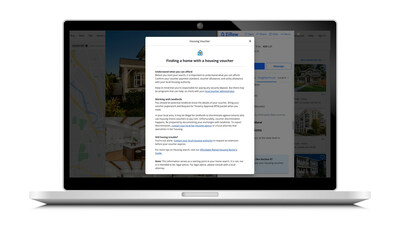New Zillow study sheds light on racial disparities in rent affordability as well as a nationwide shortfall in housing assistance
- BIPOC households in the U.S. typically spend 34% of their income on rent compared to 29% for the typical white renter household.
- Roughly 19 million U.S. households qualify for housing choice vouchers based on their income, but only 2.4 million vouchers are available.
- Zillow recently launched a new listing feature that helps inform renters of their rights and how to report source-of-income discrimination.
SEATTLE, April 29, 2024 /PRNewswire/ — A new Zillow report uncovers deep-seated disparities in housing affordability across the country, particularly between BIPOC and white renter households. Although the magnitude of rent increases has slowed since the peak in 2022, nearly half of all renter households remain cost-burdened,1 with BIPOC households disproportionately affected.
In 2022, the typical BIPOC renter household in the U.S. spent 34% of their income on rent, while white households spent 29%. More alarming gaps appeared in several of the country’s major metro areas, such as New Orleans, where BIPOC households spent 45% of their income on rent compared to 32% for white households. Notably, the median income of white renter households in New Orleans was 61% higher than that of BIPOC renter households. Although racial income gaps have narrowed over time, these figures underscore significant and persistent inequalities in housing affordability.
“Despite a recent slowdown in rent hikes, rent burdens remain critically high, particularly in BIPOC communities. These financial pressures not only make homeownership increasingly elusive but also contribute to a broader economic disparity,” said Zillow senior economist Orphe Divounguy. “Combined with a persistent housing deficit and lower incomes, people of color have fewer housing options, are less likely to own, and those who do own have lower home values. We need focused efforts to tackle these issues, as stable housing is key to improving health, education and economic opportunities.”
The Largest Racial and Ethnic Disparities in Rent Burdens Among the Top 50 Metros
|
Metro Area |
Typical BIPOC Household Rent |
Typical White Household Rent |
|
New Orleans, LA |
45 % |
32 % |
|
Buffalo, NY |
39 % |
28 % |
|
Cincinnati, OH |
37 % |
27 % |
|
Pittsburgh, PA |
36 % |
26 % |
|
Cleveland, OH |
36 % |
28 % |
|
Birmingham, AL |
40 % |
31 % |
|
Atlanta, GA |
36 % |
29 % |
|
Memphis, TN |
36 % |
28 % |
|
Chicago, IL |
35 % |
28 % |
|
Boston, MA |
41 % |
34 % |
Housing assistance programs can’t keep up with rent growth
The report also points to a critical shortage of housing assistance. During the pandemic, the rapid surge in market rents widened the gap between the number of households in need of assistance and the number of available housing choice vouchers (HCVs).
In 2022, roughly 19 million U.S. households qualified for HCVs based on their income, but only 2.4 million vouchers were available. In North Port, Florida — a metro between Tampa and Fort Myers — the number of households that could be eligible for vouchers surged by 43% between 2019 and 2022. Notably, metro areas in Florida represent half of the 10 metros with the most significant increases in households that could be eligible for HCVs.
Metro Areas with the Largest Increase in Households with Incomes Eligible for Housing Choice Vouchers Between 2019 and 2022
|
Metro Area |
Households with |
Total Renter
|
Increase in Income- |
|
North Port, FL |
40,846 |
98,546 |
43 % |
|
Cape Coral, FL |
32,813 |
88,220 |
37.5 % |
|
San Antonio, TX |
272,544 |
484,724 |
32.6 % |
|
Orlando, FL |
159,630 |
399,298 |
31.3 % |
|
Lakeland, FL |
34,185 |
84,336 |
29 % |
|
Richmond, VA |
106,333 |
213,951 |
26.3 % |
|
Palm Bay, FL |
24,247 |
61,389 |
26.2 % |
|
Columbus, OH |
219,266 |
423,454 |
24.8 % |
|
Albany, NY |
77,394 |
134,986 |
19.6 % |
|
El Paso, TX |
54,799 |
111,427 |
19.1 % |
How vouchers work and how Zillow is getting involved
Housing choice vouchers, also known as Section 8 vouchers, are designed to help low-income families by paying rent subsidies directly to landlords on behalf of the families. Families then pay the difference between the actual rent and the amount subsidized by the program, typically 30% of their income, up to a rent ceiling based on fair market rent estimates from the Department of Housing and Urban Development (HUD). Since 2023, HUD has incorporated the Zillow Observed Rent Index (ZORI) into these estimates, making the voucher program more responsive to current market conditions.
However, finding a suitable housing unit that accepts vouchers remains a challenge. Despite antidiscrimination laws in some regions, many landlords still do not accept vouchers, further complicating the search for affordable housing.
To inform renters and landlords about applicable source-of-income protections, every rental listing on Zillow includes information about local discrimination laws. This information appears under the “Local Legal Protections” tab on each listing.
Zillow has also recently introduced a tool to help inform renters of their rights and how to report source-of-income discrimination. The new data-powered resource arms rental voucher holders with information about local laws that protect them; it also offers tips on finding and renting homes that fit their criteria. The tool appears on those home listings on the Zillow website where source-of-income laws are applicable.
Zillow is committed to supporting fair housing practices through federal and state advocacy initiatives. One focus is advocating for legislation to safeguard sources of income, such as housing vouchers, from discriminatory practices in the housing market. By advocating for bills that protect against income-based discrimination, Zillow aims to ensure equal access to housing opportunities for all individuals, regardless of their financial circumstances.
About Zillow Group
Zillow Group, Inc. (Nasdaq: Z and ZG) is reimagining real estate to make home a reality for more and more people. As the most visited real estate website in the United States, Zillow and its affiliates help people find and get the home they want by connecting them with digital solutions, dedicated partners and agents, and easier buying, selling, financing and renting experiences.
Zillow Group’s affiliates, subsidiaries and brands include Zillow®, Zillow Premier Agent®, Zillow Home Loans℠, Trulia®, Out East®, StreetEasy®, HotPads®, ShowingTime+℠, Spruce® and Follow Up Boss®.
All marks herein are owned by MFTB Holdco, Inc., a Zillow affiliate. Zillow Home Loans, LLC is an Equal Housing Lender, NMLS #10287 (www.nmlsconsumeraccess.org). © 2023 MFTB Holdco, Inc., a Zillow affiliate.
1 This report uses the 2022 American Community Survey one-year sample.
SOURCE Zillow



